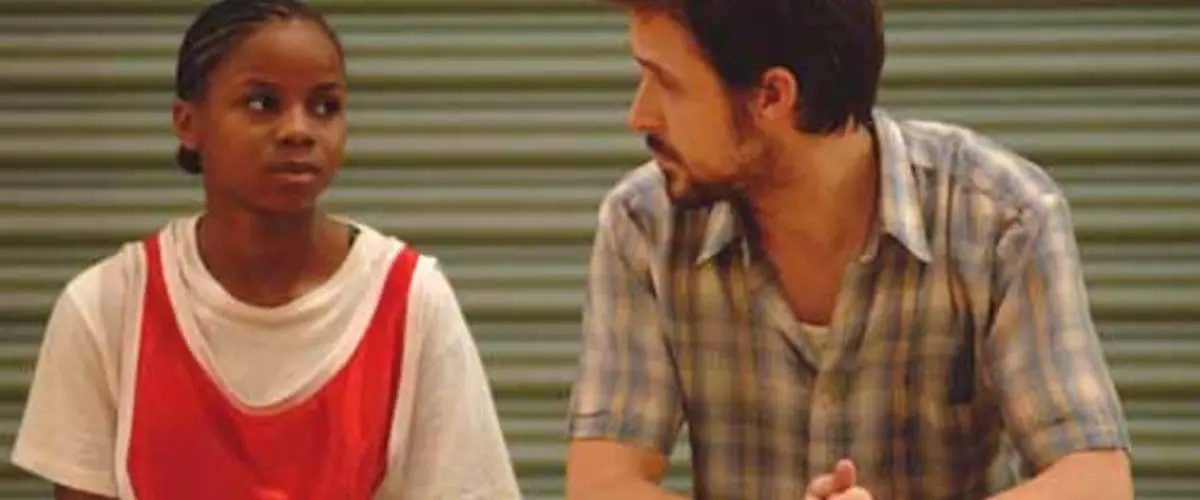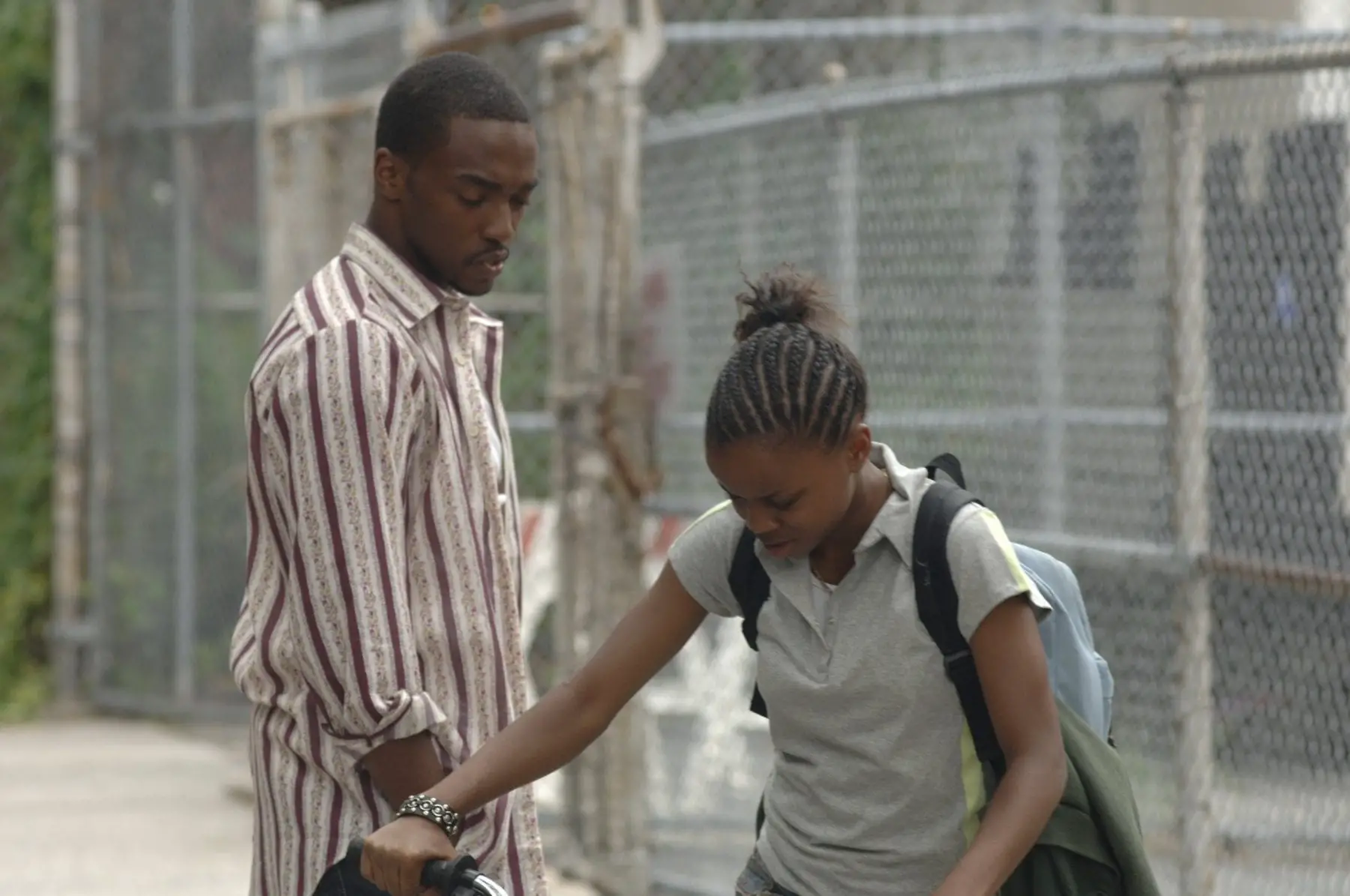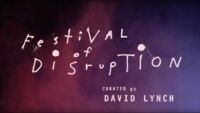Here at 25YL, we cover many different aspects of film, television, and entertainment analysis. With May being Mental Health Awareness Month, I took the opportunity to talk about a film and a subject that is very near to my heart. I am many things, but I am also an addict. Now happily in recovery, it was a challenge but also a joy to look back at Half Nelson and talk about the disease of addiction as it relates to the film, and its central protagonist Dan Dunne (Ryan Gosling). Although mostly written in the third person, when I speak about addiction and addicts’ behaviors in the article, my perspective is subjective, but from a lifetime of living with this illness. It’s time to de-stigmatize the disease of addiction and remember that mental health is health.
Half Nelson (2006) is a moving independent drama that focuses on the friendship between a white, drug-addicted history teacher and his 13-year-old black female student. Dan Dunne (Ryan Gosling in an Academy Award-nominated performance) is the teacher that you probably always wanted in Half Nelson. He rejects the curriculum in favor of more college level lessons that are designed to get his students to reject the status quo and always challenge and question the world in which they live. He is funny, good looking, and charismatic. Dan Dunne is also an extremely troubled drug addict who spends most of his free time snorting and free-basing cocaine. Drey (Shereeka Epps) is a young teen in Dan’s history class and also on his basketball team. After she catches him smoking crack in the school locker room, the two become unlikely friends in Half Nelson, trying to help each other along the way.

Half Nelson could have been just another white savior story. Filmmakers Ryan Fleck and Ana Boden (Captain Marvel) never let it fall into any sort of Dangerous Minds territory. Dan is indeed an excellent, thought-provoking teacher. Addiction, however, is an all-consuming, progressively fatal disease. Dan Dunne attempts to compartmentalize his life, to keep his life as an addict and a teacher separate things. As soon as the school bell rings he comes back to his bare apartment most nights to do cocaine, before hitting the bar for drinks, more drugs, and possible random sex. When his ex-girlfriend Rachel (Tina Holmes)—herself an addict (albeit in recovery)—comes back to town, Dan’s compartmentalized world falls down like a house of cards.
After seeing Rachel for the first time since she left him to go to rehab and get clean, Dan quickly slides farther off the rails. It’s an extremely sad thing to see two people who love each other that can’t be together. Addiction causes life to stand still for the addict still using, trapping them in the same never-ending nightmare time loop. Wake. Find. Use. Repeat. The world, however, doesn’t stop turning. Rachel met someone in treatment and is now engaged. (Anyone reading this, a romance is the quickest way to a relapse…but I didn’t write the film.) Addicts are often masking other underlying issues and/or emotions that they do not or cannot deal with.
Dan is obviously masking his sadness over the loss of his relationship with Rachel by using. It’s what he knows. Cocaine, his drug of choice, is how he feels everything and nothing at all. An addict’s drug of choice is the escape and the ultimate prison. It’s like a Kryptonite that he thinks makes him stronger. Other—often undiagnosed—underlying mental illnesses come into play with addicts. Dan seems to also be a manic depressive. He loves to perform for his students, laughing and challenging Drey and her classmates to think about the world. Alone, when the mask slips off, he’s an egocentric sad pathetic mess. He’s constantly justifiably screaming into the ether about the evils of the imperialism and systemic oppression practiced throughout U.S. history, but he can’t save the world if he isn’t willing to get help and save himself.
Drey needs Dan the most just when he begins to spiral more out of control. Drey is a smart latchkey kid. Her mom is an EMT that has to take on constant extra shifts. She is single and Drey’s father is not in her life. Drey’s brother Mike is in prison for selling drugs for local big shot dealer Frank (Anthony Mackie.) Frank sees that Drey is alone and swoops in to sink his hooks in. In no time, she’s dealing cocaine for him. The characters are so nuanced in Half Nelson it’s easy to forget that Frank is the reason Drey’s family is minus a brother. He takes the time to actually listen to Drey and relates to her in a familial way. It’s all bullshit though. It’s just a buildup for her to do the same type of drug drop-offs that presumably put her brother behind bars while Frank still enjoys his freedom.

Half Nelson never paints Dan as anything other than a sick human being. It doesn’t mask his character flaws and they don’t try to excuse any action that he does because he is an addict. Late in the film, Dan shows up wasted at fellow teacher and sometime sex partner Isabel’s place (Monique Gabriela Curnen) and sexually assaults her. The scene is absolutely unforgivable. I wish it wasn’t in the film, but it’s unflinching and honest about how much drug addiction can harm those around the addicted. Half Nelson does not make an excuse for sexual assault, it is just an inconvenient truth. Addiction is a spiritual death, and any values or sense of morality an individual have will find itself sacrificed one way or another the longer they’re using. It’s shocking. There is no redemption for this scene. It just simply is.
Don’t make the mistake of thinking you just read that sexual assault is okay if the assaulter is on substances at the time of the assault or that it somehow isn’t as bad if a woman is assaulted by an addict. It’s an explanation, not an excuse. Addicts aren’t responsible for their disease but they are responsible for their recovery. Drug addiction causes not just pain and eventual death for the afflicted, but it causes harm to those around the addict. Accountability is an essential part of recovery.
The film is shot on digital, giving everything in Half Nelson a very intimate yet hazy view that kind of mirrors Dan’s dazed state as an addict. The dinner scene with his family sheds a lot of light on his family dynamic. There are so many different things that can go into the reasoning behind why people lose themselves to addiction and Dan Dunne has so many checked off on the box, but the family dinner scene is especially revealing. Dan’s parents are middle-class baby boomers. The scene shows, without much exposition, the strain between Dan and his father (Jay O. Sanders) and the “ignorance is bliss” mentality of his mother (Deborah Rush). A lot of immediate families of addicts like to stay in some sort of denial, which only stigmatizes and causes further isolation.
Half Nelson builds towards a collision that seemed inevitable in hindsight. Nothing is really resolved in the film. Dan doesn’t get clean and save his relationship with Rachel. He doesn’t act as a white knight to the inner city kids he teaches. He does not get clean in the film. What culminates in Half Nelson does contain a glimmer of hope for Dan, thanks to Drey. In the film’s climax, Frank takes Drey to a seedy hotel to drop off some drugs. Dan is waiting inside with a group of other addicts. After a long look, Dan extends the cash and buys cocaine from his 13-year-old student. They share only a brief acknowledgment of shame.

The next day at school without announcement a new history teacher shows up to take Dan’s place. Drey bolts out and rides her bike all the way across town and finds Dan still in the hotel, alone and hung over. They go back to Dan’s apartment together where Dan shaves and horribly tells a joke that they both laugh at together. The implication is that Drey isn’t going to follow Mike’s footsteps in dealing with Frank and that Dan, who even shaves and cleans up in the ending scene, can hopefully get into recovery.
There are no guarantees, either at the end of Half Nelson or in terms of addiction and recovery. Recovery is a daily process that takes patience, honesty, and willingness. Addiction isn’t a choice or a character flaw and staying clean has fuck all to do with willpower. There’s a reason why addicts hug each other and say “just for today.” If an addict focuses on just getting through one day at a time the task of not using again ever can seem less daunting (sometimes).
Half Nelson is the rare film that doesn’t glorify or romanticize drug use or condemn it. It just tells a story that feels real and the characters entirely relatable. The world needs to watch more films like it, if only in an effort to de-stigmatize the disease of addiction itself. Ryan Fleck and Ana Boden’s Half Nelson, anchored by an amazing performance from Ryan Gosling, is a film that accurately depicts the struggles of addiction and its effects on those around it. Even if it wasn’t also an excellent film, that alone would make it worth watching. Mental health is health.




What happened to character Dan Dunne’s pet cat?